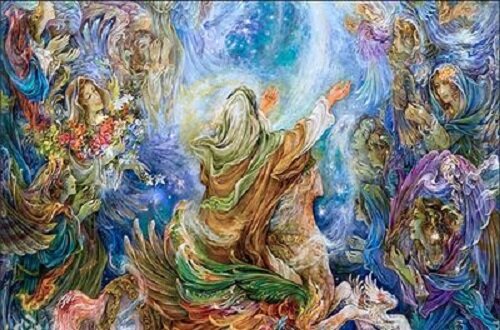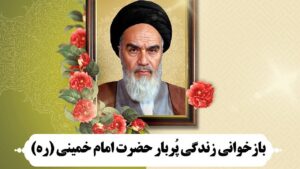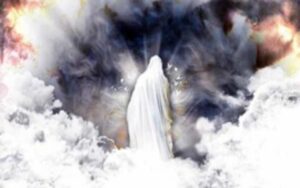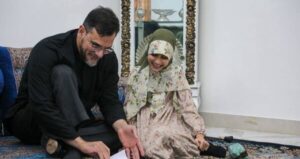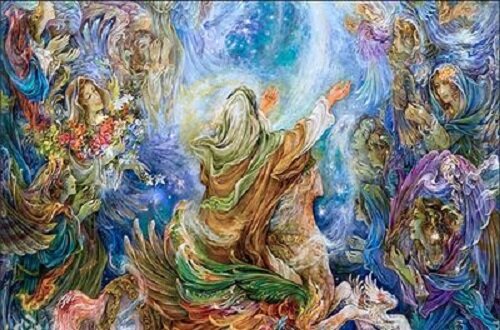
to report Missionary thought and culture baseHojjat al-Islam wal-Muslimin Najaf Lakzai considered one of the dimensions of the Prophet’s (PBUH) life that has received less attention, his way of transforming the Jahili society into an Islamic society and stated: The answer to this question that the Prophet of Islam, peace and blessings be upon him, Alas, how was he able to bring about such changes at the level of the individual and the society in a short period of time and with little resources, that after some time, a society completely different from what it was before was created. Whatever it is, the answer to the problems Our age and society.
Shafqna wrote: He clarified: If the most important concern of man today is “development” in various cultural, political and economic dimensions, and the meaning of development is to move from the existing unfavorable situation to the favorable situation, the one who is better, faster and more accurate than all others. He has succeeded in doing such a thing, he is the great prophet of Islam (PBUH).
Prophet Muhammad (pbuh) used the cultural method to transform the Jahili society into an Islamic society
He stated: Prophet Muhammad (pbuh) used the cultural method during the change, transformation and transition from the Jahili society to the Islamic society; In other words, after a person’s thoughts, ideas and beliefs change, his behavior and actions will also change, so the change in the inner content of people is considered a decisive factor. Even when the Prophet, peace and blessings of God be upon him, formed a government, he still gave priority to thought and culture.
He said: The development and transformation that Hazrat Khatami created in the Jahili society was a transformation from people whose only concern was food, clothing, and clothing, and who do not aspire to achieve any other goal, to people whose ideal and aspiration is “Allah”. . Accuracy in the characteristics of the Jahili society and the Islamic society of Madinah al-Nabi will make the mentioned claim clearer.
He continued: For the first time, the word Jahilit is used in the Qur’an for the period before the Prophethood, without specifying its geographical range. In several verses of the Holy Quran, some of the ideas, rulings and morals of ignorance are mentioned, such as idolatry, attributing life and death to nature, demon worship of some Arabs, considering God to have a daughter and worshiping angels. As daughters of God until they are subject to their intercession.
He added: Among the other characteristics of the ignorant Arabs are the things that are forbidden in the Qur’an; Such as: Sacrifice to idols, remembering fathers during the Hajj ceremony for the purpose of bragging, fighting and debauchery and rebellion during the Hajj, oppression of daughters and forbidding them from inheritance, burying daughters alive, men’s freedom in marriage and unlimited divorce. women
The meaning of Jahili society in the Holy Quran
The research assistant of the Islamic Propaganda Office stated that the word Jahilit in the Quran is not used simply to mean “ignorance” as opposed to “knowledge”, and said: Ignorance can be considered synonymous with extreme backwardness; If the society is backward in material and spiritual dimensions, and in other words, has a serious disorder, it is an “ignorant society” according to the Qur’an.
He emphasized: The Jahili period is also a period that is surrounded by a series of material and spiritual disturbances, and in general, the society does not have divine rhythm and direction. From the material point of view, the people do not enjoy a good economic situation, and from the spiritual point of view, they do not benefit from a religion that can be defended rationally and logically and free from superstitions. It is prevalent among them and according to the verses of the Quran, the condition of salvation is to avoid these issues. In terms of belief, polytheism and idolatry were prevalent among a large number of Arabs, although in addition to Jews and Christians who had divine religion, the Hanifis were also monotheistic people among Arabs.
The first change in the path of transforming the Jahili society into an Islamic society was the change of Prophet Muhammad (pbuh).
He said about the actions of the Prophet of Islam in transforming the Jahili society into an Islamic society: The first thing that happened in this regard was the change in the person of Muhammad (PBUH) and his transformation from an ordinary person to a responsible and committed person. This change was made by “Revelation” and it is referred to as “Baath”. After this incident, the Prophet (PBUH) was assigned to “revelation”, “warn” and “invite” people to God, and in this regard, he made the change in the inner content and thoughts of the people the focus of his work and activity. With the order: “Qum Fa-Anzer” he goes among the people and shouts: “Qolwa la ilaha illa Allah tuflehwa.”
He considered “Da’wat” to be a Quranic order and continued: Three years of secret Da’wat and after that public Da’wat were all based on the “principle of Da’wat”. “The principle of invitation” never left the agenda of the Prophet, peace and blessings of God be upon him, even when he was in Medina and achieved many successes in the domestic arena, he started inviting the leaders of other tribes, countries and empires to God and Islam.
He stated: In general, the actions of the Prophet (PBUH) in this regard can be divided into two parts: actions aimed at “change in thoughts” and actions aimed at “change in behavior”. Of course, a change in behavior requires a change in thoughts, but we have two types of thinking and, according to sages, two types of wisdom: theoretical wisdom and practical wisdom. Theoretical wisdom means knowledge of what is, like knowledge of the existence of God, and practical wisdom means knowledge of dos and don’ts. Doing and leaving these dos and don’ts and building political, economic, social, cultural and religious structures accordingly is at the disposal of us humans.
The Prophet (PBUH) created a religious revolution in the people
He stated that the Holy Prophet (PBUH) brought about a religious revolution and said: Introducing God to the people with all his characteristics and attributes, negating polytheism and expanding the thought of godliness and monotheism, and in other words, changing people’s worldview. description of angels and angels; Description of human existence and the place of intellect, soul and spirit in him; Description of prophecy and leadership and the nature of the spirit; description of death, afterlife and resurrection; Describing the good and bad nations of the past and calling them to think about their history are the most important actions of the Messenger of God in the theoretical dimension.
He also pointed to the practical aspect of the Prophet’s actions and said: Presenting actions and words to bow and praise God and worship Him, such as prayer, presenting models of behavior and speech to honor fellow human beings and create stable human relations, presenting a practical model in regulating the relationship between the people and the government. which was realized in Madinah al-Nabi. According to this model, the formation and organization of Komet was formed on the basis of public allegiance and participation and divine approvals and was in the service of the Ummah. There was no mention of tyranny and self-determination, and consultation in affairs had taken its place. Verses such as “Wa Shawarham Fi Amr”, “Wa Amrham Shuri Binham” were the foundation for everyone’s participation. Ensuring people’s happiness, prosperity, security and independence was one of the goals of the Islamic State. There was no mention of economic and political discrimination and all those who were among the followers of that Imam had sincere cooperation and were benevolent towards each other. Of course, the Prophet, peace and blessings of God be upon him, and the Muslims and the nascent Islamic community, both in Mecca and Medina, also had enemies, the polytheists, Jews, and then the hypocrites were among the most important of them.
Lak Zaei said about the reasons for the Prophet’s success in changing the Jahili society to the Islamic society despite the enmity of the infidels and polytheists and the breaking of the covenant of the Jews: The main role in these changes and transformations is related to the change that has happened in the intellectual and inner content of humans. The intellectual and content revolution causes all the values, cognitions, knowledge, beliefs, postures, attitudes, tendencies and even feelings and in general the culture of a society to change. The development of religious wishes and desires should be provided.
He reminded: In the thirteen year period of Mecca, all actions are aimed at cultural and spiritual issues; In other words, in this period, the focus of activities is “individualization”, as in Medina period, the focus of activities is “community building”. Of course, during this period, military issues such as the Battle of Badr, Uhud and Ahzab and other military clashes occurred, but none of these battles were fought to impose religion on others, but had a defensive aspect.
The head of the Research Institute of Islamic Sciences and Culture said: The Prophet of Islam (PBUH) succeeded in using cultural methods and tools to replace the sheikh of the tribe with prophethood and divine leadership, Islamic religion and Islamic values instead of Jahili values, and monotheism instead of polytheism. responsibility instead of avoiding responsibility, belief in resurrection instead of belief in an empty and futile future, work and production, ownership, wealth and wealth being a means to gain good instead of theft, usurpation, laziness, looting, poverty, and purpose The existence of wealth, moral virtues instead of moral vices, helping the needy and freeing slaves instead of enslaving oppressed people and enslaving them, world government instead of tribal government, Islamic and human interests instead of tribal interests, trust instead of mistrust, competition in charity instead of competition in evil, sacrifice and justice instead of robbery and oppression, and trying to achieve a better future instead of stagnation and trying to maintain the status quo.
He said: The Prophet, peace and blessings of God be upon him, used only legitimate means to achieve these goals and ideals, because treachery, treachery, aggression, and force have no place in the life of the Prophets, peace be upon them, therefore, in the verses of the Qur’an, Justice and avoiding transgression and overstepping are emphasized.
The deviations after the death of the Prophet did not create a disturbance in the foundation of the teachings of the Messenger of God
He said about the return of the Islamic society to the Jahili society after the death of the Holy Prophet: Although there was a deviation in this movement after the death of the Prophet (PBUH), but this deviation was not enough to be able to build in the noble palace that the Prophet (PBUH) had established. cause a fundamental disturbance. The Prophet of Islam, peace and blessings of God be upon him, established a culture and civilization that continues to move until today. Although this culture has faced stagnation, decline and degeneration in some periods, but due to the existence of the Qur’an, which is a constant source of divine revelation, its potential for life and growth is always preserved.
He emphasized: The greatness of what the Prophet (PBUH) did and the amount of changes and transformations he brought about becomes clearer when we compare the era of the Prophet (PBUH) with a few years later from a political perspective. When the society in some ways returned to the values of Jahili.
It was good to instill religion in the people through the methods of preaching and arguing
He pointed out: The Prophet of Islam (PBUH) established a new civilization by changing the beliefs of the Arabs and changed those ideals by bringing a new religion called Islam and with the help of “revelation”. It was good to instill this religion to the people through the principle of invitation and using the methods of wisdom, preaching and debate, not through economic, military and political methods. The Prophet (PBUH) did not entice anyone to convert to Islam. The bazoor and the sword did not force anyone to accept the new religion. He did not promise to succeed or grant positions and positions to anyone to be his friend and helper, but he explicitly rejected and denied such requests and declared: “La Ikrah Fi Al-Din”. It is on this basis that in the religion of Islam, if an action is done out of reluctance, there will be no consequences for it. Religion is optional and if it is optional it is valuable.
He added: The change in the inner content of the Arabs caused them to realize “Allah” which means the “absolute ideal” and it was at this time that by expressing their dissatisfaction with the existing situation, they tried to reach the desired situation alongside the Prophet, peace and blessings of God be upon him. ; A general and everyone’s effort that led to the strengthening of Muslims and after that, they went there at the invitation of the people of Yathrab and formed the Islamic system (Madinah) and defended this system against the enemies with legitimate means, and thus the civilization Azim Islami was founded.
Revival of Islamic culture and building a new Islamic civilization depends on intellectual and cultural efforts
Regarding the relationship between the current societies and the ideal society of the Prophet (PBUH), Lak Zaei said: Currently, the revival of Islamic culture and the building of a new Islamic civilization that fits the new age and time depends on intellectual and cultural actions and efforts, and this production It is thought, thought and knowledge that will become the foundation of material production.
He added: “Real development is when people have developed.” If humans reach development and excellence, they will fulfill their duties and there is no need for many social institutions. In an advanced Islamic society, the lack of police force (and not military) is a sign of development and excellence, because people do not transgress due to their inner control (Taqwa). But in a developed society, materially, the increase of police forces is a sign of development, because when humans are not equipped with internal controls, it is natural that they should be controlled from the outside. Anyway, from the point of view of Islamic culture, development and excellence are relative matters and more progress depends on more effort.
He said: The countries that are called “developed” today are far from the ideal society of the Holy Prophet and it seems that the education of science and religion is the key to development and excellence.
منبع: www.khabaronline.ir

